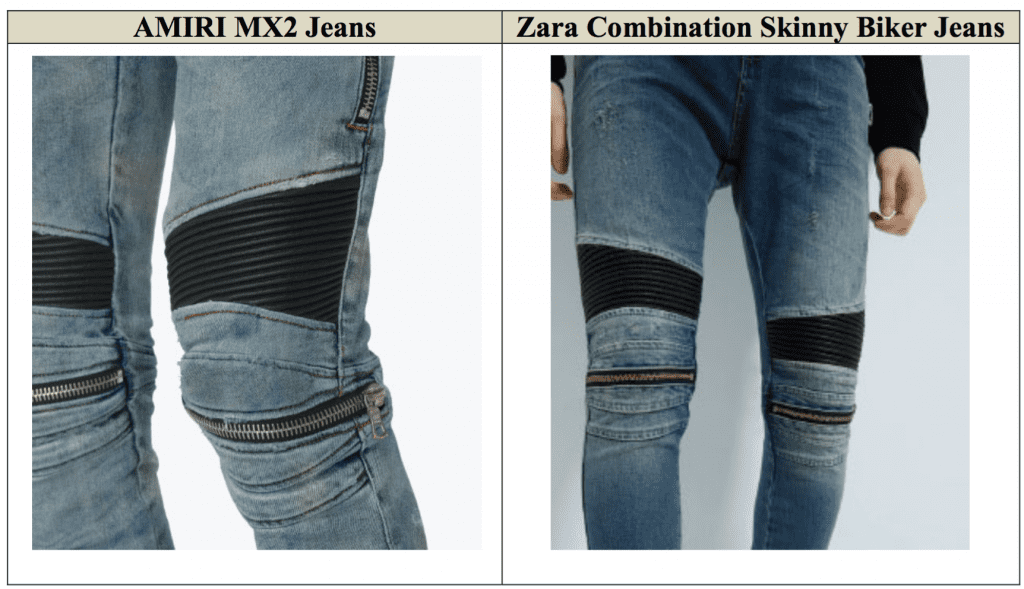After filing a $3 million-plus suit against Zara early this year, accusing the “serial infringer” of running afoul of the law thanks to its sale of specific biker-style jeans – a pair that the budding Los Angeles-based fashion brand says has “obvious and overwhelming similarities” to its own $1,150 MX2 jeans, AMIRI has filed an amended complaint in order to include Zara’s even-deeper-pocketed parent company Inditex as a defendant.
In the new complaint that it filed in a California federal court on Monday, AMIRI asserts that not only is Zara allegedly on the hook for infringing the design of its best-selling biker jeans, Inditex is, too, and as a result, is similarly liable for all of the claims that it set out in its original complaint, including federal trade dress infringement and dilution, and unfair competition, and trade dress dilution and unfair competition under California state law.
According to AMIRI’s amended complaint, Zara and Inditex “blatantly and unlawfully misappropriated [its] valuable trade dress rights” in its best-selling MX2 jeans by way of their “own lower-quality, knock-off Combination Skinny Biker jeans.” The MX2 jeans – which AMIRI says that it launched in January 2019 – “are distinctive and instantly recognizable.” Hence, AMIRI’s trade dress infringement claims, in furtherance of which the brand asserts rights in a design that consists of “stretch denim, pleated leather panel detailing, zippered outside thigh pockets, zipper closures at the knee-line, and hand-distressed abrasions throughout.”
The brand argues that those elements, taken together, are “a prominent, well-known and famous indicator of the origin,” i.e., a trade dress, a subset of trademark law that provides protection for the configuration – including the design and shape – of a product itself, as long as that configuration has amassed “secondary meaning” in the minds of consumers.
While the amended complaint largely mirrors the original, AMIRI adds some new allegations, including that Zara and Inditex’s $50 “Combination Skinny Biker Jeans have the same look and feel as the authentic AMIRI MX2 jeans, [and] notably, share the same distinctive pleated leather panel detailing, side zippered thigh pockets, zippered knee closures, and skinny fit washed denim.” As AMIRI previously asserted, “Side-by-side comparisons of the AMIRI MX2 jeans and the Zara Combination Skinny Biker jeans confirm the obvious and overwhelming similarities between the two products.”
In the newly-filed complaint, AMIRI argues, however, that “on closer inspection, the similarities are even more profound,” and that “Zara Combination Skinny Biker jeans are shown to have precisely the same distinctive and non-functional design elements as the AMIRI MX2 jeans,” an “overlap” that AMIRI claims is “deliberate and is intended to reinforce a perceived association between Zara and the high-end luxury AMIRI label.”

Still yet, AMIRI asserts that “at no time did Inditex or Zara obtain a license or any other permission or authorization from [it] that would allow [them] to sell jeans having the same look and feel as the authentic MX2 jeans.”
In lieu of a license, AMIRI argues that Inditex and Zara’s manufacturing and selling of the lookalike jeans amounts to “blatant, willful, and conscious disregard for [AMIRI’s] rights, and were knowingly and intentionally taken to capitalize on the goodwill, recognition and fame associated with the AMIRI MX2 jeans.” Moreover, the alleged confusion that they have caused among consumers (namely, as to the source of the allegedly infringing jeans and whether AMIRI has endorsed or is otherwise affiliated with the fast fashion company’s jeans) has given rise to and continues to cause “injury to [AMIRI’s] goodwill and business reputation and dilution of the distinctiveness and value of the famous and distinctive AMIRI MX2 jeans.”
With the foregoing in mind, AMIRI sets forth claims of trade dress infringement and dilution, and unfair competition, among others, and argues that it has suffered damages, including as a result of confusion amongst consumers as to the source/nature of Zara and Inditex’s copycat jeans, “believed to be in excess of $3,000,000.” The brand is seeking monetary damages, as well as injunctive relief to immediately and permanently bar Zara and Inditex from making and selling the allegedly infringing pants.
As for the strength of AMIRI’s trade dress claims, we noted in connection with the initial complaint that while the MX2 pants have certainly been the subject of a fair share of unsolicited (i.e., not directly paid-for) media attention thanks to their adoption by celebrities, such Odell Beckham, Jr., Future, Tyga, and Kris Wu, which bodes well from a secondary meaning perspective, it will be interesting to see whether AMIRI will actually be able to convince the court that consumers link the trade dress at issue to a single source. In making a claim for trade dress infringement, AMIRI has the burden of establishing that the design at issue has acquired “secondary meaning” in the eyes of the public – or that consumers recognize the design as being associated with a single company. (Once it establishes that it has a valid trade dress, assuming that it can do so, infringement liability on behalf of Zara and Inditex will depend on whether there is a likelihood of confusion.)
One of the potentially glaring issues when it comes to AMIRI establishing trade dress, aside from the fact that it only began using the trade dress-bearing jeans in 2019, is that other, bigger, more-established brands – namely, Saint Laurent (under the direction of Hedi Slimane) and Balmain (in its halcyon Christophe Decarnin days) – offered up and sold similar style pants before the release of the MX2’s. Against that background, it may be difficult for AMIRI to show that consumers associate the jeans with a single brand, as opposed to being a style of jeans that is not connected to a single source, and therefore, does not function as trade dress.
In its response to AMIRI’s initial complaint, Zara denied the brand’s claims, asserting, among other things, that the brand does not have “any protectable trade dress rights [in the jeans design]” because the design is “functional, generic, ornamental, and/or not distinctive.”
*The case is Atelier Luxury Group LLC v. Zara USA, Inc., 2:20-cv-00675 (C.D.Cal.)














